 A key component to growing up is to consider, and come to terms with, the compromises one must make with one’s life: most of us will be ordinary, productive citizens, not major league ballplayers or celebrated actors. Over the course of a human lifetime, that still leaves plenty of time, and room, for drama. The scope is considerably broader when it’s a country that’s the subject of the exercise. The articles Ari Shavit collects in his engrossing book “My Promised Land” together form a kind of biography of Israel. This deeply affecting book provides an analysis of the existential crises that still challenge the state of Israel. It’s a deeply felt, conflicted, judgmental, and compelling look at the country over the century and a quarter from the arrival of the first European immigrants. Shavit outlines the crises Israel has overcome, including the influx of non-European Jews and the wars for its existence fought in 1948, 1967, and 1973, and shows how those events shape Israel’s response to the difficult issues it faces — Arab nationalism, Muslim fundamentalism, the increase in the population of Orthodox Jews among them — in the twenty-first century.
A key component to growing up is to consider, and come to terms with, the compromises one must make with one’s life: most of us will be ordinary, productive citizens, not major league ballplayers or celebrated actors. Over the course of a human lifetime, that still leaves plenty of time, and room, for drama. The scope is considerably broader when it’s a country that’s the subject of the exercise. The articles Ari Shavit collects in his engrossing book “My Promised Land” together form a kind of biography of Israel. This deeply affecting book provides an analysis of the existential crises that still challenge the state of Israel. It’s a deeply felt, conflicted, judgmental, and compelling look at the country over the century and a quarter from the arrival of the first European immigrants. Shavit outlines the crises Israel has overcome, including the influx of non-European Jews and the wars for its existence fought in 1948, 1967, and 1973, and shows how those events shape Israel’s response to the difficult issues it faces — Arab nationalism, Muslim fundamentalism, the increase in the population of Orthodox Jews among them — in the twenty-first century.
Each chapter focuses on a particular period, starting with Shavit’s great-grandfather’s first trip to what would become Israel but was then called Palestine, in 1897. Herbert Bentwich was a bourgeois Victorian who toured the country, fell in love with it, and eventually settled there. In the early days, the Zionist pioneers bought land and cooperated with their Arab and Bedouin neighbors. They also had a vision: the Herzl Zionists, Shavit says, knew they were “faced with a radical problem: the coming extinction of the Jews.” Not that they foresaw the Holocaust; rather, says Shavit. Rather, Theodor Herzl, the founder of Zionism, knew that in Eastern Europe life was “intolerable and that in the West, assimilation is unavoidable; in the East, Jews are in danger, while in the West, Judaism is in trouble.”
Shavit follows this chapter with descriptions of the establishment of the collectivist kibbutz and moshav systems and the beginnings of irrigated agriculture, focusing on the development of orange groves. Throughout, Shavit recognizes, remembers, and describes the impact of the work on the people already there: the Arabs and Bedouin. Sometimes Jews and Arabs worked side by side in neighboring fields; sometimes Jews hired Arabs; other times, Arabs picked up and left. In the 1930s, when the British were still governing Palestine, the Arabs rebelled. The Arab Revolt was put down, but many were killed, and the scars go deep on both sides.
Shavit goes on to describe the absorption of the survivors of World War II, housing construction, and the development of potent symbols including Masada. There’s a chapter on Israel’s decision and hard work to acquire the bomb. Others describe the impact of the influx of Sephardic Jews, the Six Day War of 1967 and the Yom Kippur War of 1973. Shavit faces the many difficult questions: the logic behind the settlements in the West Bank, the intifada, the Palestinians. The entire world has played a role in the Middle East, and every player – Europe, the United States, the non-Arab Muslims, the Arabs, the Jews – has failed to grapple with the possibility of a moral or strategic compromise. Yet the vision of Zionism was impressive, Shavit says, “ambitious but not mad,” and persistent. It hasn’t failed, quite, he argues, yet its premises – feeble Arab resistance to mass immigration of Eastern European Jews – did not in fact arise. So Zionism, Shavit writes,
became an unruly process of improvising imperfect solutions to acute challenges, addressing new needs, adjusting to new conditions and creating new realities. It reinvented itself again and again, dealing in different ways with what is basically an impossible situation. This is how Zionism wended its way through the twentieth century and this is how it shaped the land.
There’s hope for Israel in the 21st Century, Shavit argues, but it will take a lot of work, and strong leadership, and moral clarity. Shavit believes that it’s imperative for Israel to withdraw from the occupied territories, though he does not believe that doing so will result in peace. Whether you agree with his conclusions or not, Shavit’s thoughtful book is an important contribution to the debate about the future of the Middle East. Anyone with an interest or opinion needs to read it. Let us know your thoughts in the comments.
Have a book you want me to know about? Email me at asbowie@gmail.com. I also blog about metrics at asbowie.blogspot.com.
